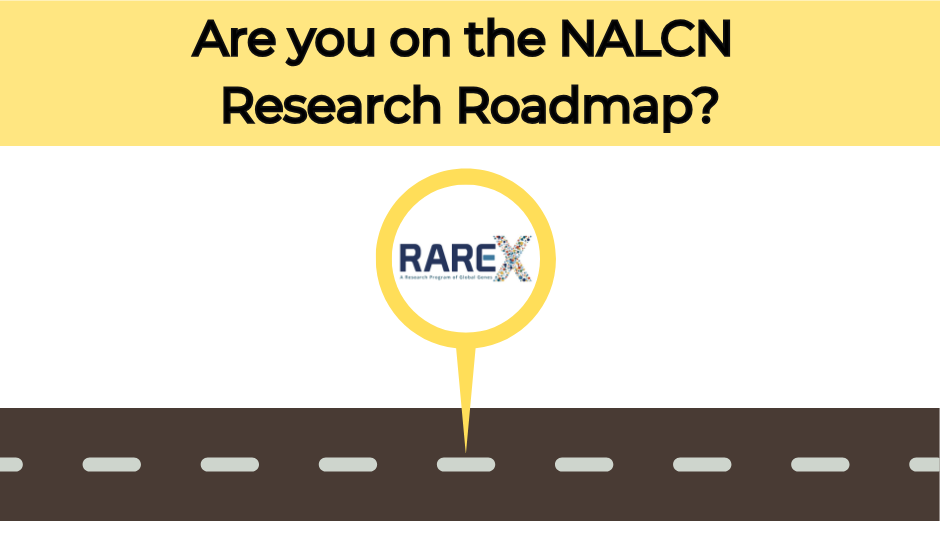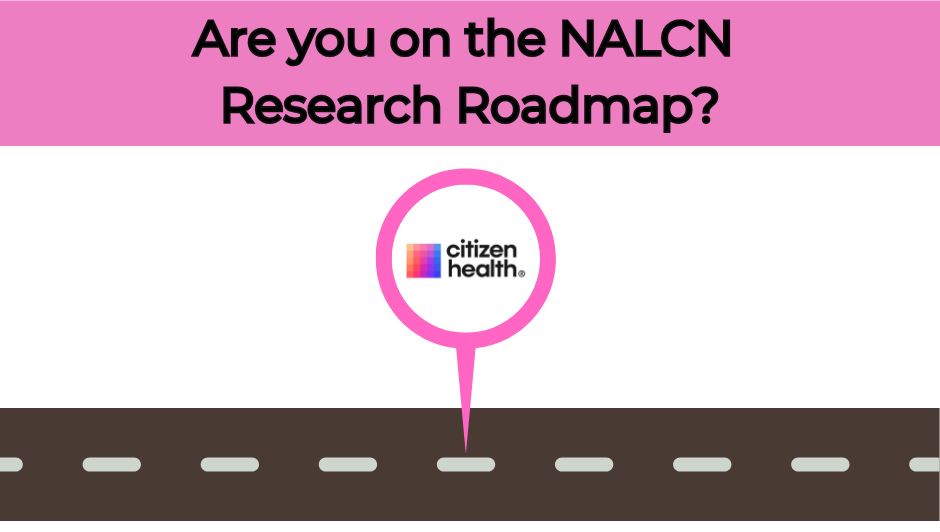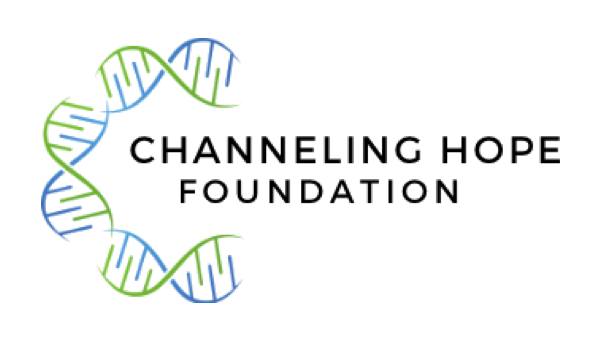Patient Resources
Information about NALCN Channel-related disorders can be found in this Fact Sheet from the New South Wales Center for Genetics Education.
PATIENT-DRIVEN RESEARCH

Are you on the NALCN Research Roadmap? Patients and families can help drive research by submitting medical information through the following trusted resources to connect to researchers. The more data we can provide researchers, the greater chance we have at reaching our vision - a world without the complications of NALCN-related diseases. Below are the current platforms to contribute data. We have made every effort to limit duplication across the platforms, and each serves a very important purpose to our NALCN research roadmap.

STEP 1: Create CRID for NALCN Patient
Connecting participant data across multiple sources while maintaining data security is crucial for working together on rare diseases. CRIDs (Clinical Research IDs) are a tool to make this connection. They give individuals a unique universal ID, making it simpler for doctors, scientists, and patients to centrally share and access confidential information to collaborate effectively. We ask that you create a CRID for your family member by following the steps below:
Go to the website https://thecrid.org/ to create a CRID for your family member. (You can also create one for yourself. It's quick and easy!)
l.Click on Create an Account and enter an email address: You will receive an email at the entered address with a link to create a login account (username, password, name, and backup email).
2.0nce logged in to My CRID Dashboard click Add New Person: Information you will enter to create the ID will be patient name, sex, birthdate, disease name, gene, and genetic variant.
3.You will receive a Unique Identifier that can be shared with approved research studies and medical providers. Save your identifier! Note: The launch of the RareX Registry will utilize this CRID for your patient information. We are also working to connect it to the Citizen study.
You can visit the Setup CRID webpage for these step-by-step instructions.
CRID Principles:
• CRID is always free for the parent/patient.
• CRID is always optional in a research study.
• CRID data is always private and will never be sold or shared.

Step 2: Participate in CHF Patient Survey
We have created a short survey-known as a "contact registry"-to collect essential information. Your responses will help us estimate the number of patients with NALCN channel genetic mutations and strengthen our application.
Survey Link: https://redcap.uthscsa.edu/REDCap/surveys/?s=PHEMFFLRLTR47NC9&ref=channelinghope.org
Why Your Participation Matters: Natural history studies are crucial for understanding the progression of rare diseases. They help design more effective and relevant clinical trials. By participating, you contribute valuable data that can lead to better treatments, improved patient care, and, ultimately, a cure. Your loved one's medical history, when de-identified and analyzed, provides insights that are otherwise difficult to obtain.
Your Privacy is Our Priority: We understand the importance of privacy and confidentiality. All medical records will be de-identified to ensure your personal information remains secure. Channeling Hope has confirmed its entire team and every partner is committed to maintaining the highest standards of patient data protection.
Join Us in Making a Difference: Together, we can advance our understanding and pave the way for new treatments and cures. Thank you for your support and dedication to our community.

Step 3: Sign up for Rare-X to contribute to community data
This platform collects genetic report details and responses to surveys based on symptoms in NALCN patients.
1) Create an account for the NALCN patient on RareX at https://rare-x.org/nalcn/
2) Data Sharing: When signing up, you will be asked what data you want to be made available to researchers. Here are Channeling Hope's recommendations:
- Select "General Research" under types of research to be as broad as possible. Types of research include (1) Health/Medical/Biomedical research which focuses on understanding diseases, their causes, and how to treat or prevent them. Participation in this research could lead to improved health outcomes in patients, development of personalized medicine for patients, and innovations in health technology. (2) Other Kinds of research includes social, demographic, and genetic traits, as well as broader societal studies. Participation in this research type could lead to understanding health disparities, influencing health policy, improving research methodologies, and understanding genetic and environmental interactions.
- Click "No additional limits on research" to be as broad as possible. Fewer limits on the research data collected from patients can increase the data collected and possibly incentivize pharmaceutical and biotech companies to target treatments for rare diseases.
- Click "Yes" under Patient Community Connections to share your contact information (name and email only) with Channeling Hope so that we can keep you updated on opportunities to connect with the NALCN patient community and research updates from our scientific community.
- Click "'Yes" under Including Your Data in Summaries on the RARE-X DCP Data Dashboard to help provide information to the Rare Disease research community beyond Channeling Hope.
You can watch a webinar CHF hosted that explains RARE-X Partnership on YouTube here: https://www.youtube.com/watch?v=tQ9Ltt1pI5U&t=3s

Step 4: Sign up for Citizen Health to collect medical records for NALCN patient
Channeling Hope's partnership with Citizen Health will drive breakthroughs in research and accelerate cures for rare diseases like NALCN-related disorders. The Citizen Health team takes on the burden of health record collection for you, helping you have your health information accessible to help you be more informed and more prepared, and allow you to participate in research.
This collaboration will allow Channeling Hope Foundation to collect the necessary information from patients to complete a Natural History Study for NALCN-related disorders.
1) Sign up the NALCN patient at: https://www.citizen.health/partners/nalcn
2) Request that Citizen Health collect health records on your behalf directly from the healthcare providers you designate. Once your records are released by the provider, they are uploaded to your Citizen Health account. Alternatively, you can upload your records into your account directly.
3) Share your health information by granting someone access to your Citizen Health profile through the "Care Team" or "Share" features. You can grant access to anyone you choose simply by providing an email address for the person with whom you want to share your information. You can designate how long that person should have access to your account and you may revoke access at any time.
Citizen Health will also notify you of opportunities for you to share your health information - and you can decide, either in advance or at the time you receive notice of each opportunity, whether or not you want to share your information.
Citizen Health uses HIPAA-compliant cloud services to maintain your information. Additionally, we encrypt information locally and have stringent policies for staff regarding access to information aimed at ensuring your information is protected at all times. Subject to our policies and terms of use, only you have access to these records. No third parties have access to this information unless you consent to share it with them.

CONTACT OTHER PATIENT FAMILIES:

We are grateful to the families that started support groups before the Channeling Hope Foundation was created. These Facebook groups are not managed by Channeling Hope, but can be a resource to families for support and information.
NALCN Gene Flaw Family Support Group

The following WhatsApp community is a resource to families for support and information. To be invited, please email us and give us your phone number including the country code.
NALCN Families
CLIFAHDD Syndrome
IHPRF Type 1 & 2

The following resources are connections we have made that you might find helpful:

Once Upon a Gene is a blog and podcast about her family's journey through life with rare disease.


